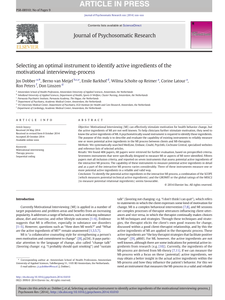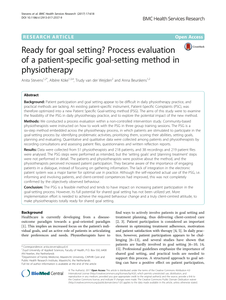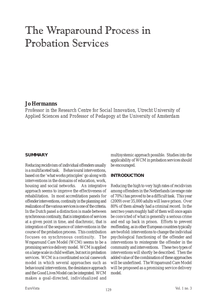This article investigates the phenomenon of rebound effects in relation to a transition to a Circular Economy (CE) through qualitative inquiry. The aim is to gain insights in manifestations of rebound effects by studying the Dutch textile industry as it transitions to a circular system, and to develop appropriate mitigation strategies that can be applied to ensure an effective transition. The rebound effect, known originally from the energy efficiency literature, occurs when improvements in efficiency or other technological innovations fail to deliver on their environmental promise due to (behavioral) economic mechanisms. The presence of rebound in CE contexts can therefore lead to the structural overstatement of environmental benefits of certain innovations, which can influence reaching emission targets and the preference order of recycling. In this research, the CE rebound effect is investigated in the Dutch textile industry, which is identified as being vulnerable to rebound, yet with a positive potential to avoid it. The main findings include the very low awareness of this effect amongst key stakeholders, and the identification of specific and general instances of rebound effects in the investigated industry. In addition, the relation of these effects to Circular Business Models and CE strategies are investigated, and placed in a larger context in order to gain a more comprehensive understanding about the place and role of this effect in the transition. This concerns the necessity for a new approach to how design has been practiced traditionally, and the need to place transitional developments in a systems perspective. Propositions that serve as theory-building blocks are put forward and include suggestions for further research and recommendations about dealing with rebound effects and shaping an eco-effective transition. Thomas Siderius, Kim Poldner, Reconsidering the Circular Economy Rebound effect: Propositions from a case study of the Dutch Circular Textile Valley, Journal of Cleaner Production, Volume 293, 2021, 125996, ISSN 0959-6526, https://doi.org/10.1016/j.jclepro.2021.125996.
DOCUMENT

Motivational Interviewing (MI) can effectively stimulate motivation for health behavior change, but the active ingredients of MI are not well known. To help clinicians further stimulate motivation, they need to know the active ingredients of MI. A psychometrically sound instrument is required to identify those ingredients. The purpose of this study is to describe and evaluate the capability of existing instruments to reliably measure one or more potential active ingredients in the MI process between clients and MI-therapists.
MULTIFILE

Background: Patient participation and goal setting appear to be difficult in daily physiotherapy practice, and practical methods are lacking. An existing patient-specific instrument, Patient-Specific Complaints (PSC), was therefore optimized into a new Patient Specific Goal-setting method (PSG). The aims of this study were to examine the feasibility of the PSG in daily physiotherapy practice, and to explore the potential impact of the new method. Methods: We conducted a process evaluation within a non-controlled intervention study. Community-based physiotherapists were instructed on how to work with the PSG in three group training sessions. The PSG is a six-step method embedded across the physiotherapy process, in which patients are stimulated to participate in the goal-setting process by: identifying problematic activities, prioritizing them, scoring their abilities, setting goals, planning and evaluating. Quantitative and qualitative data were collected among patients and physiotherapists by recording consultations and assessing patient files, questionnaires and written reflection reports. Results: Data were collected from 51 physiotherapists and 218 patients, and 38 recordings and 219 patient files were analysed. The PSG steps were performed as intended, but the ‘setting goals’ and ‘planning treatment’ steps were not performed in detail. The patients and physiotherapists were positive about the method, and the physiotherapists perceived increased patient participation. They became aware of the importance of engaging patients in a dialogue, instead of focusing on gathering information. The lack of integration in the electronic patient system was a major barrier for optimal use in practice. Although the self-reported actual use of the PSG, i.e. informing and involving patients, and client-centred competences had improved, this was not completely confirmed by the objectively observed behaviour. Conclusion: The PSG is a feasible method and tends to have impact on increasing patient participation in the goal-setting process. However, its full potential for shared goal setting has not been utilized yet. More implementation effort is needed to achieve the required behaviour change and a truly client-centred attitude, to make physiotherapists totally ready for shared goal setting.
DOCUMENT

This paper describes a study into consumers' reasons for buying socially responsible (SR) products, such as Fair Trade products and organic meat. As opposed to other studies, we use a qualitative approach based on 25 in-depth interviews and include several different products in the research. This leads to several new results, such as: (1) buying SR products is perceived as an imperfect moral duty; (2) low quality of SR products is a dissatisfier, but high quality not a satisfier; (3) the attitude towards SR products is related to the reputation of charitable funds; (4) the demand for SR products is negatively related to the frequency of purchasing SR products; (5) reflection on SR products raises the demand for SR products; (6) consumers that have witnessed the social problems that SR products aim to alleviate purchase more SR products. Finally, we find that the demand for different SR products is correlated: if a consumer buys one SR product, it is more likely that (s)he purchases other SR products as well.
DOCUMENT

Reducing recidivism of individual offenders usually is a multifaceted task. Behavioural interventions, based on the ‘what works principles’ go along with interventions in the domains of education, work, housing and social networks. An integrative approach seems to improve the effectiveness of rehabilitation. In most accreditation panels for offender interventions, continuity in the planning and realization of the various services is one of the criteria. In the Dutch panel a distinction is made between synchronous continuity, that is integration of services at a given point in time, and diachronic, that is integration of the sequence of interventions in the course of the probation process. This contribution focuses on synchronous continuity.
DOCUMENT

This research investigates to what extent lecturers at universities of applied sciences do regard differentiated rewards—intended to develop and/or display professionalism—to be fair, and to what extent, and in which form, do these stimulate their willingness to (further) professionalise and/or display professionalism. This was a case study research design, and a factorial survey measurement technique was used to collect data. We argue that lecturers believe it is fair that forms of differentiated rewards are used and applied in order to have them develop and/or display more professionalism. Especially the viewpoints/practices that relate to coordination, consultation, and consideration for personal circumstances have an influence on the justice perceived. This paper contributes to the HRM literature confirming that lecturers appreciate financial stimuli enhancing their professionalism; however, elements such as consultation, respect, coordination, and communication are appreciated even more. It appeals to HRM to design new practices which have more stimulating effect on personal and professional growth in subject-specific knowledge.
DOCUMENT

This research investigates to what extent lecturers at universities of applied sciences do regard differentiated rewards(intended to develop and/or display professionalism)to be fair, and to what extent, and in which form, do these stimulate their willingness to (further) professionalise and/or display professionalism. This was a case study research design, and a factorial survey measurement technique was used to collect data. We argue that lecturers believe it is fair that forms of differentiated rewards are used and applied in order to have them develop and/or display more professionalism. Especially the viewpoints/practices that relate to coordination, consultation, and consideration for personal circumstances have an influence on the justice perceived. This paper contributes to the HRM literature confirming that lecturers appreciate financial stimuli enhancing their professionalism; however, elements such as consultation, respect, coordination, and communication are appreciated even more. It appeals to HRM to design new practices which have more stimulating effect on personal and professional growth in subject-specific knowledge.
DOCUMENT

Introduction Negative pain-related cognitions are associated with persistence of low-back pain (LBP), but the mechanism underlying this association is not well understood. We propose that negative pain-related cognitions determine how threatening a motor task will be perceived, which in turn will affect how lumbar movements are performed, possibly with negative long-term effects on pain. Objective To assess the effect of postural threat on lumbar movement patterns in people with and without LBP, and to investigate whether this effect is associated with task-specific pain-related cognitions. Methods 30 back-healthy participants and 30 participants with LBP performed consecutive two trials of a seated repetitive reaching movement (45 times). During the first trial participants were threatened with mechanical perturbations, during the second trial participants were informed that the trial would be unperturbed. Movement patterns were characterized by temporal variability (CyclSD), local dynamic stability (LDE) and spatial variability (meanSD) of the relative lumbar Euler angles. Pain-related cognition was assessed with the task-specific ‘Expected Back Strain’-scale (EBS). A three-way mixed Manova was used to assess the effect of Threat, Group (LBP vs control) and EBS (above vs below median) on lumbar movement patterns. Results We found a main effect of threat on lumbar movement patterns. In the threat-condition, participants showed increased variability (MeanSDflexion-extension, p<0.000, η2 = 0.26; CyclSD, p = 0.003, η2 = 0.14) and decreased stability (LDE, p = 0.004, η2 = 0.14), indicating large effects of postural threat. Conclusion Postural threat increased variability and decreased stability of lumbar movements, regardless of group or EBS. These results suggest that perceived postural threat may underlie changes in motor behavior in patients with LBP. Since LBP is likely to impose such a threat, this could be a driver of changes in motor behavior in patients with LBP, as also supported by the higher spatial variability in the group with LBP and higher EBS in the reference condition.
LINK
Citizen participation in local renewable energy projects is often promoted as many suppose it to be a panacea for the difficulties that are involved in the energy transition process. Quite evidently, it is not; there is a wide variety of visions, ideologies and interests related to an ‘energy transition’. Such a variety is actually a precondition for a stakeholder participation process, as stakeholder participation only makes sense if there is ‘something at stake’. Conflicting viewpoints, interests and debates are the essence of participation. The success of stakeholder participation implies that these differences are acknowledged, and discussed, and that this has created mutual understanding among stakeholders. It does not necessarily create ‘acceptance’. Renewable energy projects often give rise to local conflict. The successful implementation of local renewable energy systems depends on the support of the local social fabric. While at one hand decisions to construct wind turbines in specific regions trigger local resistance, the opposite also occurs! Solar parks sometimes create a similar variation: Various communities try to prevent the construction of solar parks in their vicinity, while other communities proudly present their parks. Altogether, local renewable energy initiatives create a rather chaotic picture, if regarded from the perspective of government planning. However, if we regard the successes, it appears the top down initiatives are most successful in areas with a weak social fabric, like industrial areas, or rather recently reclaimed land. Deeply rooted communities, virtually only have successful renewable energy projects that are more or less bottom up initiatives. This paper will first sketch why participation is important, and present a categorisation of processes and procedures that could be applied. It also sketches a number of myths and paradoxes that might occur in participation processes. ‘Compensating’ individuals and/or communities to accept wind turbines or solar parks is not sufficient to gain ‘acceptance’. A basic feature of many debates on local renewable energy projects is about ‘fairness’. The implication is that decision-making is neither on pros and cons of various renewable energy technologies as such, nor on what citizens are obliged to accept, but on a fair distribution of costs and benefits. Such discussions on fairness cannot be short cut by referring to legal rules, scientific evidence, or to standard financial compensations. History plays a role as old feelings of being disadvantaged, both at individual and at group level, might re-emerge in such debates. The paper will provide an overview of various local controversies on renewable energy initiatives in the Netherlands. It will argue that an open citizen participation process can be organized to work towards fair decisions, and that citizens should not be addressed as greedy subjects, trying to optimise their own private interests, but as responsible persons.
DOCUMENT
